

Summer 2022 | maineea.org What I Love About 2022 Maine Educator Cover Contest Winner MADISON SHEPARD Region 10 Technical High School Creative Digital Media Program


During the past two years, since the COVID-19 and staff have nimbly adapted the delivery of In many cases, local faculty and staff unions administrators to provide emergency financial assistance and enhanced and to develop short-term safety policies around COVID testing, physical mandates. Meanwhile, thousands of faculty and staff have struggled with imposed by administrators. In this annual NEA special report, we look from 2020-2021—the first full year of the pandemic—and see its effect find that fewer faculty, especially part-time faculty, are teaching, and salaries has declined. Meanwhile, faculty at historically Black colleges suffer a pay disparity. One other notable finding? The union difference—the paid more than their non-unionized peers—points to the ongoing need






MAINEEA.ORG 3 CONTENTS 4 Union News 5 MEA President's Letter 6 From MEA's Executive Director 7 Safe Schools For Everyone 8 Ineffective Reading Instructional Practices and What to Do Instead For All Students 10 MEA Launches Campaign Thanking All Educators 14 Learning From Student Voice 15 Collateral Damage: Effects of the Pandemic on Higher Ed Salaries 16 "What I Love About Maine" Cover Contest 21 94th Annual MEA Representative Assembly 22 We Are MEA 23 Pre-Retirement Seminars 24 Union Member Rights and Officer Responsibilities 25 Read Across America Recommended Books 26 Meet Nova the Therapy Dog 28 Inflation and its Impact on Educator Pay 31 Editor's Note
Illustration: molotovcoketail COLLATERAL DAMAGE: EFFECTS OF THE PANDEMIC ON ACADEME SUMMER 2022 VOLUME 82, NUMBER 4 10 8 15 14 16 22 www.maineea.org @maineea @Maineeducationassociation @MaineEA @maineea Follow us on social media
Certification Changes UpdateNew Rules Now in Place

After more than two years, the State Board of Education adopted new certification/credentialing rules. The final version of the rules include changes required by the Maine Legislature. The changes come as the State works to remove certification barriers to help bolster the teaching ranks while still maintaining well-prepared educators in our schools.
Some of the highlights of the new rule include:
• Praxis exams are no longer required. Instead of this specific requirement, an applicant for certification may choose to pass Praxis I, utilize a summative grade point average (GPA) of 3.0 for courses required for the certification, or submit a portfolio for review.

• References to the latest versions of professional standards for many certificates have been updated.
• Language was enhanced to include greater flexibility with degrees, as well as work and academic experiences.
• Course requirements for human development as well as diversity-centered content related to today’s classroom have been added.
• Many updates to Career and Technical Education certificates and endorsements have been made.
• Some grade spans have been expanded to include pre-kindergarten.
• Greater flexibility for international teachers and alternative education teachers has been added.
• Renewal requirements for some administrator certificates have been changed.
To learn more about the certification changes and view complete information from the Maine Department of Education scan here:
YOUR MEMBERSHIP WORKING FOR YOU MEA ADVOCACY LEADS TO MAJOR IMPROVEMENTS
State Funding For
Education Maintained
For the second year in a row, the State meets its commitment to funding 55% of the cost of public schools.
COVID Sick Leave
The legislature adopted a bill to provide 15 days of paid COVID leave for all school employees. It is retroactive to January 1, 2021. If someone had gone unpaid due to COVD and they had no more leave to use, they must be paid up to 15 days.
Pension Improvements
The MEA was successful in winning a 4% COLA for this year. The budget lifts the base amount of the pension by 2.4% starting July 1, 2023. It also lifts the amount of your pension not subject to state income tax from $10,000 to $25,000 for the 2022 tax year, and $30,000 and $35,000 in future years.
Deeper Investments in Student Success
MEA worked with other education partners and leaders to support funding for free meals at school for all Maine students, and free community college for 2020-2023 high school graduates.
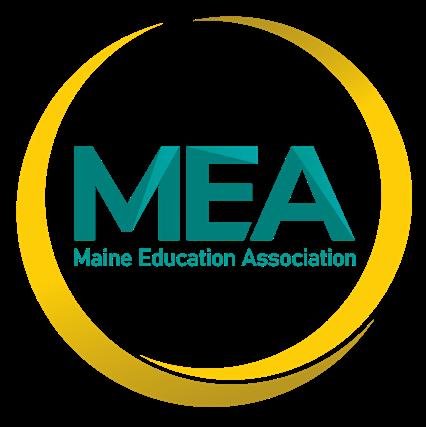
4 Maine Educator | Spring 2022
1
Union News
MAINEEA.ORG
President's Letter
Grace Leavitt - Summer 2022
Challenges…or Opportunities?
My first year as a local president, my former superintendent tried (unsuccessfully) to get me to view challenges as ‘opportunities’. I can’t remember now what ‘challenges’ we were dealing with at the time but I’m sure some were increased workload, insufficient compensation, and additional demands on public educators to address big, societal issues. Many years later, all of these are still challenges, even greater today than then. On a personal level, the challenges at the time were those typical of many young parents: struggles with work/life balance, insufficient time (and patience!) with my own children, and perennial exhaustion due to lack of sleep. Most of you can probably relate to having some or all of these challenges, both the professional and the personal ones, at some time.
So this year…Let’s just say it has been chock full of ‘opportunities’ for educators! Never, not ever, have we all had the number of challenges, not to mention the kinds of challenges-er, I mean ‘opportunities’--that we have seen come at us this past year!
And the hits just keep on coming…global pandemic, disputes on safety measures like masking, staff shortages, remote days, disinformation campaigns on issues, criticism of curriculum, attacks—at times personal—on educators and school boards, calls to ban books—just to name a few. And of course there’s also inflation, climate change, and--the worst of all--the latest round of horrific gun violence and the tragedies of innocent lives taken and those of so many others impacted forever.
Somehow in the face of at least a few of these challenges, educators have indeed found some opportunities. More outdoor classes for our students, creative ways to use technology, examining lessons and materials with an eye towards increasing recognition of diversity and being more inclusive, ways to better provide for the social and the emotional needs of our students— and of ourselves. One specific example that comes to mind was the science teacher who took the debate over masks and designed a lesson and a lab for students to learn about airborne particles. I’m sure many of you, when you pause for a moment, can think of something that was a challenge that you managed to turn into an opportunity.
Educators are by nature hopeful. And with all of these challenges, if we are to hold on to hope, we must work to turn more challenges—even the big ones--into opportunities whenever we can.
And a big challenge is right around the corner—elections next fall. As a beautiful Maine summer gets underway I know the last thing any of us want to think about is next fall! But these next elections give us a great opportunity--to work together,
to be united--to be sure we not only keep the friends of public education we’ve had in Augusta, but also to see to it that others understand the value of public education and will support educators and students.
You’ll hear more on this challenge/opportunity as the time draws nearer. For now, you have certainly earned a break! Let’s hope the greatest challenge you encounter for the next few months will be what to put on the grill or which beach to visit or what novel to read next. I know some will be working over the summer months, either in schools (thank you so much for that!) or at other jobs (another challenge we will keep working on so that it is a matter of choice rather than necessity). But even those of you who will be working will likely enjoy a change of pace and hopefully everyone has a chance to relax, recharge, and renew and refill your energy supply. We will need it, come fall, we know.
And we know that, together, we will do our darndest to be ready to face any challenge, to do all we can to turn it into an opportunity, and make our Association ever stronger and our public schools and institutions of higher learning even better.
Take care, stay safe, and stay well!
Grace Leavitt, President
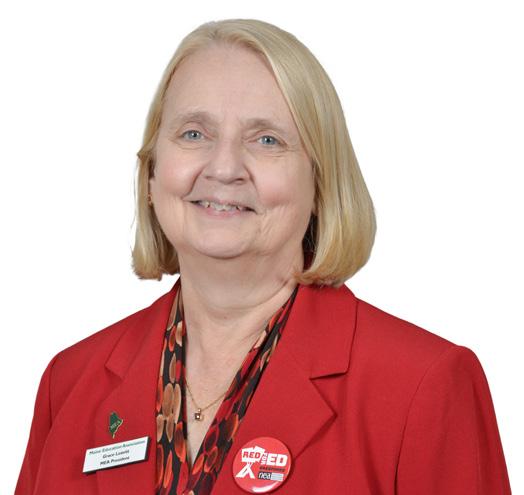 Maine Education Association
Maine Education Association

207-622-4418 x 2200
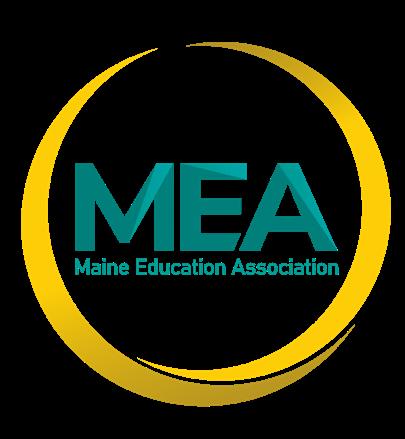
MAINEEA.ORG 5
Rachelle Bristol From MEA's Executive Director
MEA - Still Strong, Stable and Solid
I can’t believe how quickly time flies. In May, I experienced my second MEA Representative Assembly (RA) in South Portland and in person! It was amazing to be able to see and meet many of you. In some ways, it feels like no time has passed since the virtual RA in 2021, and in other ways, this year has been incredibly long and trying. I am sure you all can relate. Even so, MEA continues in a positive direction to move the needs of our members and public education forward, despite a pandemic.
During this year’s RA, I was fortunate to address the RA delegates with some organizational updates from the Executive Director’s viewpoint.
And in case you missed it, I started with some fun facts about Maine.
1. Maine is the only state with one syllable in the United States.
2. The moose IS the state animal of Maine. (We are second only to Alaska in numbers.)
3. The honeybee is the state insect.
4. Maine has the smallest lighthouse in the United States. It is Pocahontas
Light on Echo Point on Great Diamond Island.
After that, I turned to more serious matters… the MEA Board of Directors Strategic Foci adopted last July –membership growth, racial and social justice, and local capacity and member engagement. The strategic foci were designed to refocus MEA on the foundational aspects of the organization
and stabilize the union with a firm base on which to grow and build power. While the association is still strong, stable and solid, we need to stay thoughtful on how we are moving these foci. There is much to celebrate while paying attention to the areas where we need to improve.
Membership Growth
Over the last 6 years, MEA has grown or stayed relatively stable. However, in this membership year, we are losing members in both membership categories: professional and education support professionals. While the shrinking workforce can account for some loss, the trend is still troubling and highlights the need for MEA to be attractive to ALL educators – new and experienced and in all membership categories. MEA must be visible and show value to our current and potential members. We need to find spaces for our newer members to lead and participate in the association. Early enrollment (which allows an educator to join for free now with most membership benefits until the next membership year) has been helpful in the past, but even those numbers are behind where we need them to be to make up for the losses we are currently experiencing.

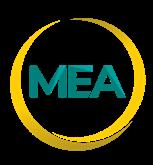

A few facts to consider:
• Only 80 out of 241 locals have grown by at least one member = 33%.
• Only 63 out of 241 locals participated in new hire events or orientations last year = 26%.
Please consider how you can invite a fellow educator to join us and how to connect to new hires. We must remain strong in numbers and purpose to maintain our influence and power.
Racial and Social Justice MEA continues our diversity, equity and inclusion (DEI) journey and is exploring ways to implement the New Business Item that was passed in this area. DEI topics are
being included in MEA trainings and conferences, and staff and governance alike are participating in opportunities for growth in these areas. The summer conference will incorporate these foci as well. The work is ongoing.
Local Capacity & Member Engagement
MEA is only as strong as our locals and our connection to our members. Last summer, we polled potential and current members on their thoughts about the union. Less than half those polled said they had been contacted by their local in the last year, and 20% of current members said they had considered dropping their membership. While there are many understandable reasons for that stat, it is a reminder that we need to maintain visibility and connections to our members. MEA took that to heart and established a member only section of our website, launched an MEA app for members only, and implemented a chat feature in both. We have worked to increase participation in MEA committees and events, including the MEA RA. If you weren’t with us in May, please consider running for your local delegate seat next year. We only have 46 locals who send delegates to the MEA RA and need more to keep member voices at the forefront. We continue to look for ways to better support our local associations and members.
As I said at last year’s RA, MEA is strong, stable and solid and remains so. However, now is not the time to let our guards down. Our members, students and communities need us now more than ever.

Thank you for all you do to make MEA strong, stable and solid. I wish you a summer filled with your favorite things and people.
Bristol MEA Executive Director
6 Maine Educator | Spring 2022
Rachelle
Pictured from right to left: Beth French MEA Treasurer, Jesse Hargrove MEA Vice-President, Grace Leavitt MEA President, & Rachelle Bristol MEA Executive Director.
SAFE SCHOOLS FOR EVERYONE What Educators Should Know About LGBTQ+ Rights
As an educator, it is important to be aware of, and educate yourself on the civil rights laws that exist to protect yourself and your students. Federal laws exist that protect students and educators from discrimination on the basis of sex, including gender identity or sexual orientation. MEA is here to help you better understand those laws.

• School Sports—Schools may not prevent transgender students from participating in athletic contests on teams that match their gender identity. (Some states have passed laws banning transgender participation in school sports, but litigation challenging those laws has been successful so far.)
• Dress Codes—Where schools have gender-specific dress codes, schools cannot prevent transgender students from following the dress code rules that match their gender identity. MEA urges school districts to adopt gender neutral and inclusive dress codes.
• Bathrooms & Other Facilities— Schools may not prevent students from using the bathrooms or locker rooms that match their gender identity.
Title IX also prohibits anti-LGBTQ+ harassment and bullying. Harassment can consist of offensive comments, gestures, and physical acts of a sexual nature, or can be non-sexual but related to sex (including sexual orientation or gender identity), by school staff or other students. Failure to treat students consistent with their gender identity, including repeated failure to use the student’s correct pronouns, can be a form of harassment.
If the school is aware that a student or students are experiencing harassment that is so frequent and severe that it prevents them from participating in school activities, the school is required by federal law to take steps to prevent it. Some of those steps are:
1. You can report a Title IX violation to the Department of Justice.
2. Students also have free speech rights at school. Generally, schools cannot censor student speech unless there is reason to think that it will substantially disrupt school activities or infringe on others’ rights. That means students should be allowed to wear or display Pride gear and speak out about LGBTQ+ Issues.
What protections do my students have?
Title IX prohibits discrimination against students based on their sexual orientation or gender identity.
The Department of Justice recently published guidance on confronting anti-LGBTQ+ discrimination and harassment in schools. Because of Title IX’s protections, schools cannot discriminate in:
• Extracurricular Activities—Schools may not exclude students from school activities, including school clubs, student office, and field trips based on the students’ sexual orientation or transgender status.
3. Under the Equal Access Act, students in secondary schools also have the right to form GSAs (Gay Straight Alliances or Gender-Sexuality Alliances), so long as the school authorizes any other extracurricular student groups, and the group is student-initiated. Schools cannot single out GSAs for extra restrictions or prevent them from using school bulletin boards, making announcements, hosting fundraisers, or engaging in other activities that the school allows other extracurricular groups to do. Have
MAINEEA.ORG 7
to ask us at
questions? Scan
maineea.org
Ineffective reading instructional practices and what to do instead for all students
 Sara Flanagan, Assistant Professor of Special Education Danielle Gabrielli, University of Maine
Sara Flanagan, Assistant Professor of Special Education Danielle Gabrielli, University of Maine
Reading is a complex, fundamental skill for all students. Effective reading instruction is crucial, especially since students may continue to struggle in reading if they are not reading on grade level in third grade (Lesnick et al., 2010). Despite the importance of reading and effective instruction, ineffective instructional practices impact instruction.
Ineffective
Instruction: Colored Overlays and Lenses
Colored overlays over text or colored lenses in glasses students wear when reading are based on the assumption that a specific color supports how the eye processes printed text by reducing visual distortions (e.g., “moving,” slanted text). This is a misperception about how students read and comprehend text, and, specifically, those with dyslexia. Dyslexia is a neurological, language-based learning disability where a student's brain, not eyes, is not correctly processing
language beginning at the phonological level of reading. Colored overlays and lenses do not impact reading accuracy, rate, or comprehension; any reading growth when using them is usually due to reading instruction or practice (Griffiths et al., 2016; Law, 2019). Colored overlays and lenses are not the same as highlighting keywords in a passage or word problem. If a student complains about visual distortions, this warrants an eye exam.
Ineffective Instruction: Special
Fonts
Fonts like the Dyslexie Font or OpenDyslexic are often aimed at students with dyslexia or other reading difficulties. These claim to reduce reading challenges due to the fonts’ design. The fonts are not based on credible information about how students read, and may reduce or not meaningfully change reading. Research suggests that any temporary, positive change in reading is due to the letter spacing and not the actual font; this same change is found with “normal” fonts with similar letter spacing (Kuster et al., 2018; Wery & Diliberto, 2017). Instead, use easy-to-read fonts with consistent spacing and at an appropriate size for students’ grade such as Calbri, Times New Roman, or Arial.
Ineffective Instruction: Learning Styles
Teaching to students’ learning style in any content area, including reading, is not an evidence-based practice, and could reduce learning and generalization. Learning styles were not meant to be applied to instructional practices. Students need to learn using multiple modalities (e.g., seeing, hearing, speaking, touching, doing), not just a preferred “style” (Bozarth, 2018). Instead, consider Universal Design for Learning (UDL) to purposefully design and deliver instruction to give flexible options and reduce barriers for how students learn and demonstrate knowledge (for more information, https://www. cast.org/). For example, if students experience difficulties with reading comprehension, teachers might pre-teach vocabulary, provide a graphic organizer, and give an option to listen to the text.
Effective Instruction
In addition to UDL, explicit instruction is a “gold standard” instructional practice that supports students’ learning across grade levels and content areas including in reading. Explicit instruction includes three stages: (1) I do where the teacher describes the purpose of the lesson and connects it to what students already know, provides background information, and models; (2) We do when the teacher uses guided practice with prompts, scaffolds, and corrective feedback; and (3) You do when students work independently to demonstrate their knowledge with corrective feedback (see Figure 1 for a summary). Each stage includes effective supports like graphic organizers and other scaffolds, strategies for specific areas of reading like decodable books, manipulatives, and technology. Additionally, instruction using multiple modalities supports reading; for example, when teaching students to read and spell a word, a student might listen to the word, read the word, build the word with letter manipulatives, then write the word in sand. When using such strategies within explicit instruction, these strategies fall in the guided practice (“we do”) stage. This type of instruction is particularly useful for struggling readers because they can practice multiple ways while being provided feedback in a structured, explicit manner (Archer & Hughes, 2011; Bursuck & Damer, 2015).
Table 1. Useful Websites
Reading-Specific Websites
Reading Rockets website provides a wide range of information on reading and writing instruction. readingrockets.org
Adlit.org includes information on supporting adolescents’ reading and writing. adlit.org
The Florida Center for Reading Research has lesson plans, student activities, and other resources on reading. fcrr.org
National Center on Improving Literacy has resources on reading for students with literacy-related needs. improvingliteracy.org
Really Great Reading has reading diagnostic assessments, instructional tools, and information. reallygreatreading.com
General Websites
Meadows Center for Preventing Educational Risk is not specific to reading, but it provides intervention resources. meadowscenter.org
The National Center on Intensive Intervention
What Works Clearinghouse
References
has resources and lessons on reading, math, and behavior. NCII has tool charts that review assessments and interventions. intensiveintervention.org
reviews research on interventions and includes practice guides (research summaries). ies.ed.gov/ncee/wwc
Archer, A., & Hughes, C. (2011). Explicit instruction: Effective and efficient teaching. The Guilford Press.
Bursuck, W. D. & Damer, M. (2015). Teaching reading to students who are at risk or have disabilities (3rd edition). Pearson. Bozarth, J. (2018). The truth about teaching to learning styles and what to do instead?
https://www.learningguild.com/insights/225/the-truth-about-teaching-to-learning-styles-and-what-to-do-instead Griffiths, P. G., Taylor, R. H., Henderson, L. M., & Barrett, B. T. (2016). The effect of coloured overlays and lenses on reading: a systematic review of the literature. Ophthalmic & Physiological Optics, 36(5), 519–544. https://doi.org/10.1111/opo.12316
Law, J. (2019). A rose-tinted cure: the myth of coloured overlays and dyslexia.
https://theconversation.com/a-rose-tinted-cure-the-myth-of-coloured-overlays-and-dyslexia-120054
Lesnick, J., Goerge, R., Smithgall, C., & Gwynne, J. (2010). Reading on grade level in third grade: How is it related to high school performance and college enrollment. Chapin Hall at the University of Chicago.
Kuster, S. M., van Weerdenburg, M., Gompel, M., & Bosman, A. M. (2018). Dyslexie font does not benefit reading in children with or without dyslexia. Annals of Dyslexia, 68(1), 25-42. https://doi.org/10.1007/s11881-017-0154-6
Wery, J. J., & Diliberto, J. A. (2017). The effect of a specialized dyslexia font, OpenDyslexic, on reading rate and accuracy. Annals of Dyslexia, 67(2), 114-127. https://doi.org/10.1007/s11881-016-0127-1
Finding Information
While some ineffective instructional practices might not “hurt” students, these take away from instructional time, potentially delaying reading progress. Finding reliable information can be difficult when search results might give conflicting or inaccurate information. When exploring an intervention, strategy, or curriculum, ask the following:
1. Is it “too good to be true?”
2. Does it match accurate information on reading?
3. Can I find the same information across multiple, credible sources and on websites other than blogs or a company’s website?
See Table 1 for a list of credible, free reading instruction websites.
Figure 1. Explicit Instruction Sequence
• Gain students' attention and state the purpose of the lesson
• Provide background knoweldge, review
• Model
• Use examples and nonexamples
• Use corrective feedback
• Reteach as neeeded
"You
• Give students independent work to practice without prompting
• Use corrective feedback
Closing, wrap-up
• Review
• Preview next lesson with how it connects to current lesson
• Assign homework/ independent work (if applicable)
MAINEEA.ORG 9
"I do" (Teacher)
"We do" (Teacher & Student)
Guided practice with students using scaffolds and prompting
do" (Students)
Thanks2You…
The campaign ran on social media in May and June. Increasing awareness in the community of the efforts of our educators is a critical goal for MEA in order to provide an accurate representation of the work you’re doing each day. On the following pages are some of the campaign components. MEA encourages you to view the video elements of the campaign on our website, maineea.org. MEA used grant funds to pay for the media campaign. Understanding a positive public image of both our public schools, educators, and our Union is crucial, and MEA will continue to work to spread this positive message.
MEA Launches Media Campaign to Thank Educators



The Maine Education Association understands how much each of our educators have been through this year and is continually working to share your efforts with the public to ensure it understands and respects what you have done for our students.
During Teacher Appreciation Week, MEA launched a campaign titled Thanks2You. The campaign shared the stories of several educators and students, detailing the challenges and successes of the year showing why each student was grateful for the educators, nurses, bus drivers, counselors, social workers and more in their lives. From helping solve a hard math problem, to a friendly hello as students climb the bus stairs in the morning – Thanks2You educators for helping us make it through!
Hope Keleher
Thanks2You teachers for individualizing instruction to make up for learning loss during the pandemic, persevering through every challenge, changing your teaching strategies and finding creative ways to meet each student’s needs, and so much more.
10 Maine Educator | Spring 2022
Thanks2You our students made it through
What you do helps us make it through.
Merita McKenzie
Megan Bain
Thanks2You physical education teachers for teaching students the importance of staying healthy, managing expectations to meet students where they are, encouraging students of all physical abilities to try new activities, and so much more.

What you do helps us make it through.


Thanks2You social workers for helping students with social skills, and teaching students to be resilient, listening when there’s a problem, without ever judging, developing strategies to help students deal with tough situations, and so much more.
What you do helps us make it through.
Lizzie Nalli
Thanks2You school nurses for your dedication to taking care of students and the community during the pandemic, flexibility with ever-changing guidelines, resiliency during the toughest year ever, and so much more.
What you do helps us make it through.
MAINEEA.ORG 11
The graduating class of 2022 has experienced more than half of their high school careers during a pandemic. From school buildings closed, to remote and/or hybrid learning, to milestones missed, and for some, loved ones taken, research shows this class is deeply affected by COVID-19.

A recent survey of high school students from 19 states, including Maine, found that one in four high school seniors in the class of 2022 have changed their post-secondary plans since the start of the pandemic. The survey, conducted by Youth Truth, sheds light on where students plan to go after high school, what kind of support they feel they have in school from adults, and which populations of students feel the most prepared, and which need the most support.
Of note: the comparison data from 2019 to 2022 for boys, students in rural schools, non-white students, and LGBTQ+ students offer important insight for educators both at the high school and college level. The data below can be used to help educators prepare for the next senior class, focusing on ways to help keep kids in school, and foster a smooth transition from high school to whatever path a student chooses. Below are some of the survey highlights.
College Bound
Nearly half of all seniors in the class of 2022 plan to attend a four-year college, however of that half there are major differences in the type of student planning to go to college. The data shows expectation gaps for students of color, those in higher poverty areas, males, those in rural schools, and LGBTQ+ students. Additionally, fewer seniors now consider two-year programs than in 2019.

Seniors in the class of 2022 who are Black or African American, or boys/men are less likely to want to go to college compared to these groups in the class of 2019.
Learning from Student
Survey from the Class of 2022 Highlights Changes in Future

12 Maine Educator | Spring 2022
Voice
Fewer seniors in the class of 2022 report having career counseling and college financial counseling than in 2019, with even fewer male students or students in rural schools seeking that support.



Dropping Out
A higher proportion of seniors in the class of 2022 who are transgender, gender non-binary, prefer to self-describe their gender, or members of the LGBTQ+ community seriously consider dropping out as compared to their peers. Additionally, students who identified being affected by the pandemic have seriously thought about dropping out.
Have you ever seriously considered dropping out of high school? (CLASS OF 2022 “YES”)

MAINEEA.ORG 13
Adult Support
Results from the complete survey and report can be found in the Maine Educator Online at maineea.org
2020-21 periods such faculty in was 2019-2020, purchasing loss the earned public compared percent significant than
also than perennial closely states’ the differ, across Wisconsin, 4-year $83,165 are 4-year and the For middle at rank by 12 4-year
Purchasing Power Reduction

Your Union Making a Difference
COLLATERAL DAMAGE: EFFECTS OF THE PANDEMIC ON ACADEME
Previous gains in faculty purchasing power also were reversed. Faculty in all ranks saw their purchasing power take a sharp downward turn in 2020-21. Declines ranged from $600 to $2,600, or 1 to 3 percent, depending on rank.
FIGURE 6. FACULTY
SALARIES
INCREASED OVER THE PAST YEAR BUT FACULTY PURCHASING POWER DECLINED.
Nominal salary and purchasing power of 9/10-month faculty, 2019-20 and 2020-21
Purchasing power
$93,155
teaching arts, communications, history and humanities are the second lowestpaid in 4-year institutions but rank near the top in 2-year institutions.
Research identifies a number of benefits related to unions and collective bargaining, both for workers and for the economy. Among the benefits for workers are: a wage premium for union members; more workers having benefits such as health insurance, pensions, and paid time off; and higher wages for typically lower-wage jobs, thus mitigating pay inequities.
nearly 7 percent rate of inflation over the same time, faculty in most states felt the brunt of a purchasing power decline.
$91,916 Nominal dollars $90,749 2019-20 2020-21
Source: ASA Research analysis of U.S. Department of Education, Integrated Postsecondary Education Data System, Faculty Salary Data, 2020-21.
and $92,000, while the salaries in 4-year institutions range more widely from $74,000 to $122,000.
Education Discipline Not Valued
FIGURE 7: ACADEMIC RANK IS CORRELATED WITH SALARY. FACULTY IN PRIVATE INSTITUTIONS GENERALLY EARN MORE THAN FACULTY IN PUBLIC INSTITUTIONS.
HOW DO SALARIES DIFFER ACROSS DISCIPLINES? Discipline matters—as does where it is taught. The difference between the lowest- to the highest-paid discipline is about $48,000 in four-year colleges, but narrows to $15,000 in 2-year colleges (Figure 10). In 2-year colleges, the average salary by discipline clusters between $77,000
9/10-Month faculty salaries, 2020-21
Faculty in health fields are the most highly paid in 4-year institutions—and the lowest paid in 2-year institutions. Meanwhile, engineering and architecture are at or near the top for both 2- and 4-year institutions. The least-paid faculty at 4-year institutions work in education and library science are the least-well paid faculty in 4-year institutions ($74,000). Notably, faculty
Faculty in health fields are the most highly paid in 4-year institutions—and the lowest paid in 2-year institutions. Meanwhile, engineering and architecture are at or near the top for both 2- and 4-year institutions. The least-paid faculty at 4-year institutions work in education and library science are the least-well paid faculty in 4-year institutions ($74,000).
FIGURE 10. BY DISCIPLINE, SALARIES IN 4-YEAR INSTITUTIONS RANGE WIDELY WHILE THE RANGE IS SMALLER IN 2-YEAR INSTITUTIONS. HEALTH IS THE HIGHEST PAID FIELDS IN 4-YEAR, BUT THE LOWEST IN 2-YEAR INSTITUTIONS. THE LOWEST PAID 4-YEAR DISCIPLINES ARE MID-RANGE IN 2-YEAR INSTITUTIONS. Faculty salaries by discipline, 2- and 4-year institutions, May 2020 (in thousands) Health $122 Engineering, Architecture
THE COLLECTIVE BARGAINING ADVANTAGE. Research identifies a number of benefits related to unions, both for workers and for the economy. Among the benefits for workers are: a wage premium for union members; more workers having benefits such as health insurance, pensions, and paid time off; and higher wages for typically lower-wage jobs, thus mitigating pay inequities.4 Further, the presence of unions can extend to those who are not members of the local union.5 Unions also have positive impacts on the economy, such as higher levels of training for members which leads to a better trained workforce; better productivity and lower rates of turnover; and higher economic growth.6 The strength of unions has supported workers through the pandemic: unionized workers are better able to gain access to protective equipment, ensure paid medical leave or time off when needed, and negotiate working conditions and potential furloughs.7
$57,550. (Note, private two-year faculty and public liberal arts faculty comprise only 1 percent each of full-time faculty.) Faculty teaching in comprehensive institutions and instructors teaching in public institutions earn slightly more, just over $100, than faculty in private institutions. Full professors are the
highest paid faculty in both public and private institutions, but they also have the largest public-private salary differential: $24,385 (or $115,528 vs. $139,913). While faculty teaching in research/doctoral-granting institutions earn the highest salaries by institutional type, faculty at two-year institutions earn the least.
advantage is $15,000 at comprehensive
Many of the 102 historically Black colleges and universities (HBCUs) were founded to African American students in the years predominantly White. Today, 52 public
MAINEEA.ORG 15
$88,277 $
$72,547 $
Source: ASA Research analysis of U.S. Department of Education, Integrated Postsecondary Education Data System, Faculty Salary Data, 2020-21. Average Two-Year Liberal Arts Comprehensive Research/ DoctoralGranting Professor Associate Assistant Instructor Lecturer No Rank
100,728
57,550 $77,295 $ 82,102 $75,872 $ 75,744 $96,987 $ 110,476 $115,528 $ 139,913 $86,201 $ 92,622 $75,753 $ 78,659 $62,209 $62,091 $61,903 $72,308 $63,593 $77,281
4-year 2-year Source: ASA Research analysis of U.S. Bureau of Labor Statistics, Occupational
and Wage Estimates. $92 $92 $89 $88 $88 $86 $83 $82 $82 $79 $77
$115 Business $113 Law, Criminal Justice, Socical Work, $102 Life Science $101 Physical Science $100 All Disciplines $98 Social Science $96 Math, Computer Science $94 Arts, communications, History, Humanities $82 Education, Library Science $74
Employment and Wage Statistics, May 2020 National Industry-Specific Occupational Employment
NEA HIGHER EDUCATION 9
Figure 11 shows average faculty salaries (in thousands of dollars) for public institutions (1) with faculty collective bargaining agreements, (2) without faculty collective bargaining agreements, but located in the same state as institutions with faculty unions, and (3) in states without any faculty collective bargaining agreements. As evidenced, in nearly all types of public institutions where faculty collectively bargain, earnings are higher than those at institutions environment
where Black students feel welcome and are embraced in thriving HBCUs graduate more Black students
$105 $99 $96 $91 $89 $83 $84 $79 $69 $67 $65 $59 Average Two-Year Comprehensive Research University
FIGURE 11. THE PRESENCE OF A FACULTY CONTRACT IS CORRELATED WITH HIGHER SALARIES. Salaries for faculty in public institutions (in thousands), 2020-21. States with no bargaining Bargaining states, institutions without contracts with contracts
Source: ASA Research analysis of U.S. Department of Education, Integrated Postsecondary Education Data System, Faculty Salary Data, 2020-21.
What I Love About
The MEA is pleased to showcase student artwork during its sixth annual Maine Educator Art Cover Contest. MEA believes in celebrating the successes of our students and members, and this cover contest gives the Union that opportunity.




Artwork was judged in the following categories: K-4, 5-8, 9-12 and Digital. Congratulations to all the students and teachers!

Winner
K-4
Cover Contest Winner Madison Shepard Region 10 Technical High School Creative Digital Media Program Teacher: Jean Palmer
Henry Bernard Manchester School Teacher: Stacey Sanborn
5-8 Winner
Grace Jiang
9-12 Winner
Abby Bisson


Region 10 Technical High School
Creative Digital Media Program Teacher: Jean Palmer
Digital Winner


Alex Arnold
Region 10 Technical High School

Creative Digital Media Program


Teacher: Jean Palmer
5-8 Runner Up Mary Gallagher
Digital Runner Up

Milo Barter
K-12 Technical High School
MAINEEA.ORG 17
Ridge View Comm. School Teacher: Susan Griffith
K-4 Runner Up Charlotte Brundige
Windsor Elementary School Teacher: Carolyn Blomerth
Noble Central School Teacher: Angela Nilles
MaineEducati
Together. A Stronger Voice.
Association
94TH ANN U AL RA2022
The MEA held its annual Representative Assembly (RA) in May. The MEA RA is
2022 MEA Representative Assembly
MEA Award Winners
Each year at the MEA RA, the Union presents awards to members and those in our community to honor the work done to support public education over the course of the school year. Below are this year's award winners.


the largest democratic body of the association, made up of educators elected by their local associations to represent their district. At this year’s MEA RA members:

• Set the course of work for the union in the upcoming school year
• Discussed and took positions on key education issues
• Honored members, education leaders, and students with awards and scholarships
On the following pages are the items voted on by the delegates at the Representative Assembly, MEA’s award winners and the winners of MEA’s Clyde Russell scholarship for students.


From MEA President Grace Leavitt to MEA RA Delegates

But change is part of our profession—as educators, in all and any of our roles, we must be lifelong learners and that means continual change, to keep working at a better understanding of how students learn, and what students need to be successful in their learning, to keep improving our ability to provide what students need for them to learn.
We must act together to do all we can to provide an honest, accurate education for our students if we are to build a better future.
We must act together to do all we can to ensure that the policy- and lawmakers that we elect believe in the common good of a strong system of public education for ALL.
We must act together to do all we can to work for a just, inclusive, equitable and strong society.
We must work together to keep growing our Association—reaching out to those who have not yet joined us and demonstrating to them the value of belonging.
We must work together—labor with management, certified staff with support professionals, higher ed with pre-K-12,
We must work together for positive, forward CHANGE.
18 Maine Educator | Spring 2022
o n
Award for Teaching Excellence Mallory Cook (Hermon EA)
ESP of the Year Kim Hubbard (Tri-County ESP)
Anne Sheehan Political Action Award Associated Facilities of UMaine, Jim McClymer, President AFUM
Anne Sheehan Political Action Award
Members of EA 22
The Clyde Russell Scholarship Fund was created by the Maine Education Association through a trust established by the late Audrey Lewis. The scholarship is available to graduating high school seniors who will attend a 4-year college and graduating high school seniors who will attend a Maine Community College. Below are the winners of this year’s Clyde Russell Scholarship.



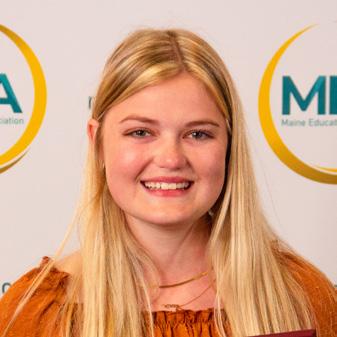




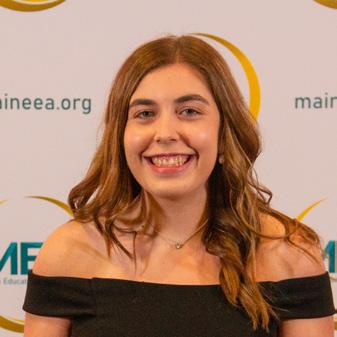



 Ashley Bryan Arts & Humanities Award Sylvia Jadczak (RSU 18 EA)
Golden Apple Award The Civil Rights Team Project
Golden Apple Award The Game Loft Human
Ashley Bryan Arts & Humanities Award Sylvia Jadczak (RSU 18 EA)
Golden Apple Award The Civil Rights Team Project
Golden Apple Award The Game Loft Human
and Civil
Rights Award Hermon High School Gay-Straight Alliance
Honor Medal Award Kara Schwartz (Hermon EA)
Honor Medal Award Kelsey Stoyanova (EA 22)
John Marvin Local Association Award Oxford Hills EA
MAINEEA.ORG 19
John Marvin Local Association Award Seacoast EA
Julia Viani Central High School
Michaela Bouthillette Biddeford High School
Cody Emerson Morse High School
Pictured:
Not Pictured: Human and Civil Rights Award
Not Pictured: Friend of Education
Not Pictured: Golden Apple Award
Grace Hall Belfast Area High School
Not
Farhia Gedow Portland High School
Dr. Larissa Malone (AFUM)
Award Senator Joe Rafferty
Todd Macarthur (Winthrop EA)
2022 NEW BUSINESS ITEMS
1. RESOLVED: that the MEA prioritizes the purchasing and marketing of union made goods when possible.
2. WITHDRAWN
3. WITHDRAWN
4. RESOLVED: that the MEA will explore avenues for grant funding opportunities to:
a. Collaborate with the state and other organizations to develop strategies to recruit, support and retain BIPOC educators in Maine.
b. Develop and implement an Ethnic Diversity Group of Educators (EDGE) partnership support program that would partner veteran MEA members of ethnic diversity with new educators and staff of ethnic diversity and of color to help them identify ways in which to engage and participate in the union and prepare for leadership roles.
c. Work towards developing a Diversity, Equity, and Inclusion staff position within the organization in order to increase membership and "ensure safe and supportive environments that are free from social and racial injustice."
5. RESOLVED: The MEA will investigate avenues to fairly demonstrate the value of the time and contributions of MEA union members serving on MEA committees through stipends, reduced membership fees.
6. RESOLVED: The MEA will review its governance documents and replace gendered language with gender-inclusive equivalents.
7. RESOLVED: The MEA will work to shift our educator culture from one of volunteerism to one of fair compensation by: 1. training members to request compensation for additional duties beyond the scope of their contracted district positions.
8. RESOLVED: The MEA will work to create or adopt an organizational definition of educational equity.
9. RESOLVED: The MEA will collaborate with the MPA and MSMA to propose legislation that protects schools from incessant Freedom of Access Act (FOAA) requests.
10. RESOLVED: The MEA will pursue legislation for education support professionals to get paid at least 9% more than the highest of City, State or Federal minimum wage as base pay.
10. RESOLVED: The MEA will work to develop and promote legislation that requires the State to provide educational services to students who are expelled.
11. RESOLVED: The MEA will create a women in education caucus.
12. RESOLVED: The MEA will create a LGBTQ+ Caucus.
13. RESOLVED: The MEA will investigate removing the phrase “Perform non-instructional, nonevaluative functions” from Chapter 115 section 5 A (1) (A) ii.
2022 NEW AND AMENDED RESOLUTIONS Amendment to B17
B17. RESOLVED: That the MEA believes that members need to be professional proactive advocates for children and public education. To accomplish that objective, the MEA also believes that:
• members can be more effective at Individual Education Plan meetings if they are knowledgeable about special education laws and regulations, transition regulations, and 504 regulations.
• local associations should have a resource person knowledgeable in special education/ inclusion/504.
• local associations should negotiate additional resources and improved working conditions in special education.
• state and local organizations involved in special education need to coordinate their services.
• members need to be knowledgeable of legal protections against harassment, student violence, and other unsafe working conditions for educators or students.
• members need to gain knowledge about issues that face our increasingly diverse students and staff, including the District’s Lau Plan, a document which describes how school administrative units (SAU) meet the needs of its English learners and fulfills its civil rights obligations to them.
• members need training on the social and
emotional needs of students.
• members need current training on bullying prevention.
• members need training on implicit bias.
• members can be more effective at language assessment committee meetings for English for Speakers of Other Languages (ESOL students) if they are knowledgeable about the student’s Individual Language Assessment Plan (ILAP).
• members need support in all of the above issues through local professional development. (Adopted 2003; Amended 2012; Amended 2015; Amended 2019; Amended 2021, Amended 2022)
Amendment to B22
B22. RESOLVED: That the MEA supports legislation that will identify all issues relating to the implementation of new technological methods of instruction which affect teachers and other school employees, as being within the scope of mandatory negotiations between the bargaining agent of the employees and their employer. These issues include, but are not limited to: workload, work hours, work assignments, evaluation and performance expectations, training and professional development, curriculum, and staffing. (Adopted 2008, Amended 2022)
New E31
E31. RESOLVED: that the MEA believes that each student’s choice of moniker consistent with their self identity and that their moniker should be respected and extended to all student approved instances that are not legal documents including but not limited to: email, yearbook, lunch card, marquee, educational software such as attendance systems, and public announcements. (Adopted 2022)
New E32
E32. RESOLVED: that the MEA believes in the support of educators teaching curriculum through an equity lens. (Adopted 2022)
New E33
E33. RESOLVED: that the MEA believes in the support of educators who resolve to share diverse and inclusive learning materials to all students in their learning environments. (Adopted 2022)
New G8
G8. RESOLVED: that the MEA believes in the importance of diversity, equity, and inclusion, and therefore believes that the efforts to view policies and practices of the Association with an equity lens must be ongoing in order for MEA to be a diverse, equitable, inclusive organization, and in order to work for a more diverse educator workforce that will help to promote equity and inclusion in our public pre-K-12 schools and institutions of higher learning. The MEA believes that all local affiliates also need to be engaged in this work at the local level. (Adopted 2022)
2022 CONSTITUTION CHANGES
CONSTITUTION ARTICLE VI, SECTION 2, PART B
ARTICLE VI. OFFICERS AND BOARD OF DIRECTORS
Section 2. Board of Directors
B. Ethnic minority members shall be guaranteed representation on the Board of Directors in the same manner as an election district is guaranteed representation, except that the count for ethnic minority members shall be based upon statewide membership totals. If there are no ethnic minority members elected to the Board of Directors in election districts, an at-large ethnic minority seat on the Board of Directors shall be created for a threeyear term utilizing any legally permissible manner. Candidates for this seat shall come from and be elected by ethnic minority members in a statewide election.
CONSTITUTION ARTICLE VI, SECTION 3, PART C
ARTICLE VI. OFFICERS AND BOARD OF DIRECTORS
Section 3. Terms of Office
C. MEA Board of Directors members shall serve no more than two (2) three-year (3) terms to begin July 15.
An exception to this is for MEA Board of Directors members who will have completed fewer than two
(2) years of a vacated seat; in this case, they will be eligible to serve two (2) consecutive three-year (3) terms.
MEA Board of Directors members who will have completed two (2) years or more of a vacated seat are eligible to serve one (1) additional three-year (3) term.
In no case will an MEA Director serve for more than eight (8) consecutive years.
CONSTITUTION ARTICLE VI, SECTION 4
ARTICLE VI. OFFICERS AND BOARD OF DIRECTORS
Section 4. Impeachment
Members of the Board of Directors may be impeached for violation of the Code of Ethics of the Education Profession or for misfeasance, for malfeasance, or for nonfeasance in office in accordance with the procedures outlined in the Bylaws.
CONSTITUTION ARTICLE VII, SECTION 2
ARTICLE VII. AFFILIATES
Section 2. Ethnic Minority Representation
Affiliates of the Association shall take all legally permissible steps to assure that their elective and appointive bodies shall have ethnic minority representation at least proportionate to the ethnic minority membership of the affiliate. "Ethnic minority" shall mean those persons designated as ethnic minority by statistics published by the United States Bureau of the Census. This designation shall specifically include American Indian/Alaska Native, Asian, Black, Hispanic, Native Hawaiian/Other Pacific Islander, and multiple races.
CONSTITUTION ARTICLE VII, SECTION 5
ARTICLE VII. AFFILIATES
Section 5. Standards and Procedures for Affiliation
Affiliates that fail to comply with standards and procedures set forth in this Constitution, Bylaws, and Standing Rules shall be subject to censure, suspension, or disaffiliation. Any such action may take place only after due notice and a due process hearing.
2022 BYLAW CHANGES
ARTICLE I. MEMBERSHIP
Section 1. Membership Categories
J. Community Ally Community Ally membership shall be open to any person interested in advancing the cause of public education, who supports the mission, vision, and core values of the Association, and who is not eligible for any other MEA membership category. The MEA Board of Directors shall adopt rules to implement this membership category.
ARTICLE I. MEMBERSHIP
Section 2. Rights and Limitations
A. Rights of Participation
1. Active, active education support and nonteaching professional members shall have the right to full participation including, but not limited to, the right to vote and hold office. Past presidents shall enjoy these privileges, unless they become a regular employee of the NEA or any of its affiliates, in which case the privileges are waived for the duration of his/ her employment with NEA or any of its affiliates.
2. Retired and student members shall only be eligible to hold office and vote for Association positions which represent their membership category, except when serving as elected delegates to the Maine Education Association Representative Assembly.
3. Reserve and staff members shall not have the right to hold office or to vote.
4. Community Ally members shall not have the right to nominate or vote for candidates for elected office, nominate, or vote for delegates to the Representative Assembly, or hold any elected office or appointed committee position in the Association.
ARTICLE I. MEMBERSHIP
Section 2. Rights and Limitations
B. Aid and Services
2. Retired, student, reserve, staff members and community ally shall be entitled to receive special services and publications of the Association.
20 Maine Educator | Spring 2022
ARTICLE I. MEMBERSHIP
Section 2. Rights and Limitations
C. Revocation of Membership Rights and Privileges
Any member whose payment of dues, according to a prearranged schedule, is in arrears by more than eight (8) weeks shall not be entitled to membership rights and privileges until such time as payment of past dues in full or a past dues payment agreement is reached and the member does not fail to adhere to the terms of the agreement.
ARTICLE I. MEMBERSHIP
Section 2. Rights and Limitations
D. Censure, Suspension, Expulsion
1. A member of the MEA can be censured, suspended, or expelled only for good cause, and shall be entitled to a due process hearing before the MEA Judicial Board in accordance with rules adopted by the Representative Assembly. If the MEA Judicial Board decides to discipline an MEA member, the member may appeal that decision to the MEA Board of Directors, whose decision shall be final—subject to appeal to the National Education Association. The MEA Judicial Board also shall have the power to vacate a censure, lift a suspension, or reinstate a member.
2. No person may appeal to the National Education Association or initiate a lawsuit or other legal proceeding in any court or other forum, with regard to the threatened or actual imposition of discipline under this section unless such person has fully exhausted the due process procedure outlined above, and has received a final decision by the MEA Board of Directors.
ARTICLE I. MEMBERSHIP
Section 4. Membership Dues
A. The annual membership dues of the Maine Education Association, for active professional members shall be calculated to the nearest dollar and shall be the greater of: (1) 2.5 percent increase over the prior year’s dues, or (2) 0.765 percent of the average salary of Maine teachers as established by the Department of Education for the second year prior to the budget year. The Maine Education Association active part-time membership shall be open to any person who is employed fifty percent (50%) or less, but greater than twenty-five percent (25%), of the normal schedule for full-time faculty members or who is on sabbatical leave. Membership dues will be calculated to the nearest dollar on the basis of fifty percent (50%) of dues for full-time active educators.
One-quarter (1/4) membership shall be open to any person who is regularly employed for twenty-five percent (25%) or less of the normal schedule for full-time faculty members. Membership dues will be calculated to the nearest dollar on the basis of twenty-five percent (25%) of dues for full-time active professional educators.
ARTICLE I. MEMBERSHIP
Section 4. Membership Dues
C. The Association shall allow credit to first-year active or active education support members who join the Association during their first year of membership eligibility, the reduction of their dues being ten percent (10%) per year for each year of their student membership and/or for each year of their student membership up to four (4) years. The first-year active member shall provide proof of membership to be eligible for credit, and the Association shall verify student membership.
D. Any person (1) who joins as an active or active education support member for the first time after the commencement of the membership year, (2) who becomes eligible for active or active education support membership after the commencement of the membership year, or (3) who returns to professional education employment or to an education support position from a limited leave of absence after the commencement of the membership year, or (4) who is hired after the commencement of the membership year shall be enrolled in full standing for the remainder of the membership year by paying the amount of annual dues which is commensurate with the remaining portion of the membership year.
E. The MEA Board of Directors may establish reduced membership dues for persons eligible for active or active education support membership who are included in a group of employees (1) that is
attempting to become an affiliate of the Association or (2) for which an affiliate of the Association is attempting to become the recognized organization. The amount of the dues charged such persons, and the Association services and benefits for which they are eligible, shall be determined by the Board of Directors on a case-by-case basis. The Board of Directors shall adopt rules for implementing this Bylaw.
ARTICLE I. MEMBERSHIP
Section 4. Membership Dues
E. The MEA Board of Directors may establish reduced membership dues for persons eligible for active or active education support membership who are included in a group of employees (1) that is attempting to become an affiliate of the Association or (2) for which an affiliate of the Association is attempting to become the recognized organization. The amount of the dues charged such persons, and the Association services and benefits for which they are eligible, shall be determined by the Board of Directors. The Board of Directors shall adopt rules for implementing this Bylaw.
ARTICLE I. MEMBERSHIP
Section 4. Membership Dues
K. Military Reservists – Active membership status will be maintained for any active MEA member who is a military reservist called to active duty. Dues for this membership category will be suspended when his/her salary is terminated and will remain suspended until the school salary is resumed.
ARTICLE I. MEMBERSHIP
Section 4. Membership Dues
M. Dues of Community Ally members shall be established by the Representative Assembly in the program budget.
ARTICLE II. REPRESENTATIVE ASSEMBLY Section 1. Allocation of Delegates B. In apportioning or reapportioning delegates, the Structure and Bylaws Committee shall adhere to the principle of one-person, one-vote. Each governance affiliate shall provide proportionate representation by educational position and shall seek to achieve ethnic minority representation at least proportionate to its ethnic minority membership by all legally permissible means.
ARTICLE II. REPRESENTATIVE ASSEMBLY Section 5. Elections
F. The President and the National Education Association Director(s) shall also serve as delegates to the National Education Association Representative Assembly with limited rights.
ARTICLE III. NATIONAL EDUCATION ASSOCIATION REPRESENTATIVE ASSEMBLY Section 1. Active and Active Education Support Professionals
Only persons who have been and remain active and active education support members of the Maine Education Association and the National Education Association are eligible to be delegates to the National Education Association Representative Assembly. Elections shall be conducted in accordance with procedures outlined in the MEA Standing Rules and Elections Handbook and the NEA Election Guidelines.
ARTICLE IV. OFFICERS
Section 1. Powers and Duties of the President I. serve as delegate to the Maine Education Association Representative Assembly; and J. serve as a delegate to the National Education Association Assembly subject to the limitations as specified in the Constitution of the National Education Association; K. perform all other duties applicable to the office of President.
ARTICLE IV. OFFICERS Section 2. Powers and Duties of the Vice President
D. serve as a delegate to the Maine Education Association Representative Assembly
ARTICLE IV. OFFICERS
Section 3. Powers and Duties of the Treasurer E. serve as a delegate to the Maine Education Association Representative Assembly
ARTICLE V. BOARD OF DIRECTORS
Section 2. Duties
B. Members of the Board of Directors shall: 3. serve as delegates to the Maine Education Association Representative Assembly.
ARTICLE VI. COMMITTEES
Section 2. Standing Committees
A.
Government Relations Committee
A Government Relations Committee shall consist of members representing each of the UniServ Districts, one (1) education support professional member, one (1) Maine Education Association retired member, and one (1) student. Where representation from each UniServ District is not feasible, the President shall have the option of filling committee positions with at-large appointments for not more than one (1) year. Committee members shall be appointed for three-year (3) terms.
C. Instruction and Professional Development Committee
An Instruction and Professional Development Committee shall consist of one (1) member from each of the UniServ Districts, one (1) education support professional member, one (1) member of the Maine Education Association retired, and one (1) student. Where representation from each UniServ District is not feasible, the President shall have the option of filling committee positions with at-large appointments for not more than one (1) year. Committee members shall be appointed for threeyear (3) terms.
D. Statewide Bargaining Committee
A Statewide Bargaining Committee shall consist of one (1) member with bargaining expertise from each UniServ District, one (1) education support professional member selected from the state atlarge, one (1) Maine Education Association retired member, and one (1) student member. Where representation from each UniServ District is not feasible, the President shall have the option of filling committee positions with at-large appointments for not more than one (1) year. Committee members shall be appointed for three-year (3) terms.
ARTICLE VII. GOVERNANCE AFFILIATES AND ACADEMIC NON-GOVERNANCE AFFILIATES Section 2. Governance Affiliates
D. The Association shall not affiliate a governance affiliate unless it meets the following minimum standards:
1. each governance affiliate shall apply the one-person, one-vote principle for representation on its governing bodies except that the governance affiliate shall take such steps as are legally permissible to achieve ethnic minority representation at least proportionate to its ethnic minority membership;
ARTICLE VII. GOVERNANCE AFFILIATES AND ACADEMIC NON-GOVERNANCE AFFILIATES Section 2. Governance Affiliates
D. The Association shall not affiliate a governance affiliate unless it meets the following minimum standards:
4. the governance affiliate shall be reviewed by the Association to determine compliance with minimum standards for affiliation at least once every five (5) years;
ARTICLE VII. GOVERNANCE AFFILIATES AND ACADEMIC NON-GOVERNANCE AFFILIATES Section 5. Censure, Suspension or Disaffiliation
A. For cause shown, the Board of Directors may censure, suspend or disaffiliate any affiliate. Such action may take place only after due notice and a due process hearing as required by the MEA Constitution. In the event an adverse action is taken, said affiliate shall have the right to appeal the decision to a seven-member (7) appellate jury which shall be comprised of disinterested Representative Assembly delegates according to the following selection procedure: the Maine Education Association Executive Director shall make available a current listing of the Maine Education Association Representative Assembly delegates from which the aggrieved party and the Maine Education Association President shall select the seven (7) jurors under a striking procedure. The decision of the jury shall be binding on all parties.
MAINEEA.ORG 21
MEA is proud of all its members and appreciates you each day. Here are a few members we would like to recognize as we close out the school year.


RSU 21
Thank you to the bus drivers and employees in RSU 21 who met with US Secretary of Education, Miguel Cardona to explain the difficulties drivers are facing. Bus drivers explained how they used federal funds to entice drivers to apply and stay on the job, including giving them bonuses. MEA members shared ways the regulations for bus drivers can change to help make it easier for people to apply and stay on the job, including creating new training manuals that only include lessons needed to drive a bus; and removing regulations that don’t pertain to bus drivers can help increase candidates for openings around the state and country.

"My Hero Works" at School Essay Contest Winners
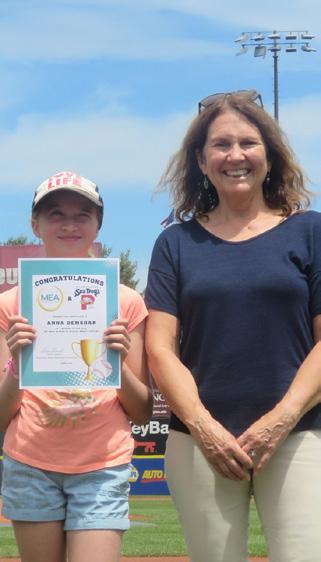
Congratulations to our two winners of the "My Hero Works at School" Essay Contest.
Student: Anna Demshar Kingfield Elementary School, Hero: Melissa Hoisington (Mt. Abram TA)
Student: Carter Bennett Maranacook Middle School Hero: Adam Scarpone (Maranacook Area Schools Assoc.)

Maine Association of School Libraries Awards



Congratulations MEA Member Iris Eichenlaub (Megunticook TA) on being named the 2022 Walter J. Taranko Maine School Librarian of the Year!
Congratulations to MEA member Elizabeth Lu Detwiler (Lewiston EA) who won the 2022 Maine Association of School Libraries (MASL) Support Staff of the Year!
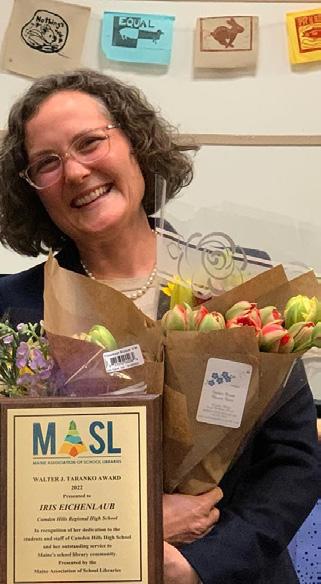

22 Maine Educator | Spring 2022 WE
ARE
CONGRATULATIONS 2022
Kelsey Boucher, Androscoggin Heather Anderson, Aroostook Matthew Bernstein, Cumberland Stacey Augustine, Franklin Seth Mitchell, Kennebec Bethany Goding Knox Tracy Stover, Lincoln Ashley Bryant, Oxford Emily Albee, Penobscot Nycole McEwen, Piscataquis Kathleen Clark, Sagadahoc Alyssa Stephens, Washington Melissa Luetje, York
We Are MEA
MEA
MEMBERS SELECTED AS MAINE COUNTY TEACHERS OF THE YEAR
Congratulations MEA Member Karl Kruetz (AFUM) on being named one of three UMaine 2022 Presidential Award winners!
Karl Kruetz
Congratulations to MEA Members Hillary Hoyt (EA 22) and Jamie Karaffa (RSU 16 EA) for winning the Maine Milken Award!
Hillary Hoyt & Jamie Karaffa
(Left): Carter Bennett with Hero Adam Scarpone. (Right) Anna Demshar with Hero Melissa Hosington. Photo credit: Portland Sea Dogs
Superintendent of Kennebunk Schools, Dr. Terri I. Cooper, members of RSU 21 featured with US Secretary of Education Miguel Cardona and US Representative from Maine Chellie Pingree.
(Left): Hillary Hoyt (EA 22). (Right) Jamie Karaffa (RSU 16 EA).
Pre-Retirement Seminars 2022-23 Session Schedule

MEA-Retired and MEA sponsor retirement sessions for individuals considering retirement this year or within five years.
All meetings are held through Zoom, beginning at 5:00 p.m. until 6:15 p.m. on two consecutive evenings.
Registration opens two weeks in advance of the sessions. Materials used in each presentation and the Zoom link are sent to MEA members in advance. Members should be prepared to attend both evening sessions.
Session
Session 4
Session 5
Session 6
1/11/2023
Tues., 1/17/2023 Wed., 1/18/2023 MEABT & GPO/WEP
Tues., 2/7/2023 Wed., 2/8/2023
Tues., 3/7/2023 Wed., 3/8/2023
MEABT & GPO/WEP
MEABT & GPO/WEP MEPERS
MAINEEA.ORG 23 Supplemental insurance products can help pay for out-of-pocket expenses from covered accidents or illnesses, such as transportation, childcare and deductibles. Plus, they’re more affordable than you may think. • Cancer insurance • Disability income insurance • Accident insurance • Hospital insurance If you’re faced with an accident or sudden illness, would you be prepared? Life is full of unexpected moments National Teachers Associates Life Insurance Company, a Horace Mann Company, underwrites Horace Mann supplemental insurance products. Horace Mann and its affiliates enter into agreements with educational associations pursuant to which Horace Mann or its affiliate pays the educational association to provide various ser vices that are aimed at familiarizing the association’s members with the Horace Mann brand, products or ser vices. For more information or to ask questions about your educational association’s ser vices agreement, please email your inquiry to association.relations@horacemann.com SI-000041MEA (9 21) Contact your Horace Mann representative to learn more or visit horacemann com/locator. horacemann.com 2022-2023 Session Schedule Fall Sessions Session Date Presenters
1
10/19/2022 MEABT & GPO/WEP MEPERS
2
10/25/2022
10/25/2022 MEABT & GPO/WEP MEPERS
Sessions
Session
Tues., 10/18/2022 Wed.,
Session
Tues.,
Wed.,
Spring
3
Tues., 1/10/2023 Wed.,
MEABT & GPO/WEP MEPERS
MEPERS
MEPERS
Union Member Rights and Officer Responsibilities Under the LMRDA and CSRA
The Labor-Management Reporting and Disclosure Act (LMRDA), which applies to the National Education Association and some NEA affiliates, and the Civil Service Reform Act (CSRA), which applies to members of the Maine Education Association, guarantee certain rights to union members and impose specific responsibilities on union officers. The United States Department of Labor’s Office of Labor Management Standards (OLMS) enforces many of the provisions of these laws, while certain provisions, such as the member bill of rights, may only be enforced by union members through private suit in federal court.
Union Member Rights
BILL OF RIGHT S – Union members have:
• equal rights to participate in union activities
• freedom of speech and assembly
• voice in setting rates of dues and assessments
• protection of the right to sue
• safeguards against improper discipline
COPIES OF COLLECTIVE BARGAINING AGREEMENTS –
Union members and nonunion employees covered by the agreements have the right to receive and inspect copies of collective bargaining agreements.
REPORTS – Unions are required to file information reports, copies of constitutions and bylaws, and an annual financial report with OLMS. Unions must make the reports available to members and permit members to examine supporting records for just cause. The reports are public information and are available from OLMS.
OFFICER ELECTIONS – Union members have the right to:
• nominate candidates for office
• run for office
• cast a secret ballot
• protest the conduct of an election
OFFICER REMOVAL – Local union members have the right to an adequate procedure for the removal of an elected officer guilty of serious misconduct.
TRUSTEESHIPS – Unions covered by the LMRDA may only be placed in trusteeship by a parent body for the reasons specified in the LMRDA or CSRA.
PROHIBITION AGAINST DISCIPLINE – A union or any of its officials may not fine, expel, or otherwise discipline a member for exercising any LMRDA or CSRA right.
PROHIBITION AGAINST VIOLENCE – No one may use or threaten to use force or violence to interfere with a union member in the exercise of LMRDA or CSRA rights.
Union Officer Responsibilities
FINANCIAL SAFEGUARDS – Union officers have a duty to manage the funds and property of the union solely for the benefit of the union and its members in accordance with the NEA Constitution and Bylaws. Union officers or employees who embezzle or steal union funds or other assets commit a federal crime punishable by a fine and/or imprisonment.
BONDING – Union officers or employees who handle union funds or property must be bonded to provide protection against losses if their union has property and annual financial receipts which exceed $5,000.
LABOR ORGANIZATION REPORTS – Union officers must:
• file an initial information report (Form LM-1) and annual financial reports (Forms LM-2/3/4) with OLMS.
• retain the records necessary to verify the reports for at least five years.
OFFICER REPORTS – Union officers and employees must file reports concerning any loans and benefits received from, or certain financial interests in, employers whose employees their unions represent and businesses that deal with their unions.
OFFICER ELECTIONS – Unions must:
• hold elections of officers of local unions by secret ballot at least every three years.
• conduct regular elections in accordance with their constitution and bylaws and preserve all records for one year.
• mail a notice of election to every member at least 15 days prior to the election.
• comply with a candidate’s request to distribute campaign material.
• not use union funds or resources to promote any candidate (nor may employer funds or resources be used).
• permit candidates to have election observers.
• allow candidates to inspect the union’s membership list once within 30 days prior to the election.
RE STRICTIONS ON HOLDING OFFICE A person convicted of certain crimes may not serve as a union officer, employee, or other representative of a union for up to 13 years.
LOANS – A union may not have outstanding loans to any one officer or employee that in total exceed $2,000 at any time.
FINES – A union may not pay the fine of any officer or employee convicted of any willful violation of the LMRDA.
The above is only a summary of the LMRDA and the CSRA Standards of Conduct. A more detailed fact sheet from the U.S. Department of Labor’s Office of Labor-Management Standards (OLMS), including contact information for OLMS, can be found at dol.gov/olms/regs/compliance/comp_pubs/ LMRDAFactSheet2017.pdf
24 Maine Educator | Spring 2022
Read Across
Welcome to Maine


Thank you to all our students and Maine educators who participated in MEA’s Read Across Maine reading journey! Hundreds of students in schools all over Maine hopped on board the I-95 reading journey, reading new books and learning new words.
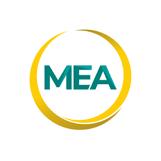

MEA is excited so many students were #SpottedReading! Special congratulations to our two winners, 1st grade teacher, Melissa Savage from Fayette Central School, and student Valdemiro, from Laurie Daniels 4th grade class at East End Community School in Portland. Melissa won a $500 gift card and purchased new books for her classroom library, and Valdemiro received tickets for himself and his family to the Maine Wildlife Park. Congrats to all!
4th grade teacher, Laurie Daniels at East End Community School in Portland, and student Valdemiro.

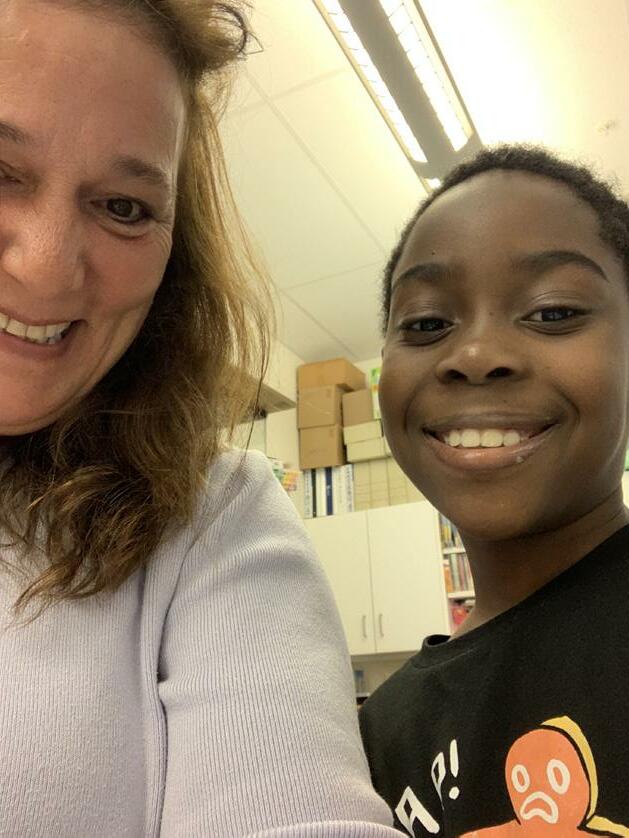

Students used this map to track their reading during the Read Across Maine journey.

NEA’s READ ACROSS AMERICA: CELEBRATING A NATION OF DIVERSE READERS TITLES FOR TEEN READERS
Summer 2022 - Determine Destiny
Elementary
Zonia's Rain Forest
By Juana Martinez-Neal
Zonia, a young Asháninka girl whose home is with those she loves in the Peruvian Amazon, spends carefree time with her animal friends of the rain forest until one day she visits a place where the forest has been destroyed.
Middle Grade
The Girl and The Ghost
By Hanna Alkaf
Suraya, a twelve-year-old Malaysian girl, inherits her grandmother’s pelesit and becomes best friends with the ghostly demon, whom she names Pink.
Through
Young Adult

After the Rain
By by Nnedi Okorafor adapted by John Jennings
While visiting her grandmother's village, Chioma, a Nigerian-American police officer, answers the door during a storm to find a boy with a severe head wound whose touch burns like her fire and who pulls her into the world of Igbo spirits.
100 words,
walks the streets of
MAINEEA.ORG 25
Cover images used with permission.
Two African-American teens find themselves working together
solve
100 chapters, each
sixteen-year-old Will
The students of Marjory Stoneman Douglas High School share their Seventeen stories that offer unique perspectives to explore what it
to
Meet Nova Therapy Dog Breeds Student Success

From Puerto Rico to Mechanic Falls, Nova the 38-pound rescue dog, had a remarkable journey from stray left homeless after Hurricane Maria to classroom therapy dog at Elm Street School in teacher Rebekah Bilodeau’s classroom.

“I’ve always been interested in having therapy dogs to come in for the kids to read to, and when I got Nova I saw how calm she was, so I went forward with the process of training her,” explained Bilodeau.
The 8-month training was an extensive process. Nova was required to perform 10 different tasks including walking through a crowd of people without acknowledging them, remaining calm during a loud noise, and sitting and staying on command.
When Nova passed each test, Bilodeau received permission from her school principal to begin a once weekly visit with Nova at the school. Once a week turned daily when the teachers and administrators saw how much of an impact Nova had on the entire school community.
“It’s incredible. I had students who didn’t want to come to school, they were truant, and they come to school now,” said Bilodeau.
Nova has a home in the classroom, a bed in the corner near Bilodeau’s desk, and while she spends time resting there, she also makes her way to the learning spaces, snuggling up on the reading rug or lying down under the team table.
26 Maine Educator | Spring 2022
“Nova makes me feel happier, she makes me feel comfortable and safe. Nova helped make it easier to come to school after the pandemic,” said fourth grade student, Riley.

While “on duty” and wearing her therapy dog vest at the school, Nova knows she is in work mode. She doesn’t bark, doesn’t chase or jump, and only goes outside when the students have recess or breaks, and is trained to relieve herself only during these times so as not to disrupt the day of learning. Nova is so well trained she even knows where her “friends” are in the school.
said Kiley.
“She knows certain classrooms she knows she wants to go to because there are certain teachers who give her treats,” added Bilodeau.
The real treat though is for the students, who after the pandemic, need additional emotional support.
“It’s better with her here because when she is here, she makes me feel happy and she calms people down,” said Kiley.
And when the students are calm and feel safe, they’re ready to learn—and that’s success thanks to a rescue dog who returned the favor to Bilodeau by rescuing her students during the most difficult year yet.


MAINEEA.ORG 27
“It’s better with her here because when she (Nova) is here, she makes me feel happy and she calms people down,”
Inflation and its impact on Educator Pay

Each year, the NEA’s Department of Collective Bargaining and Research complies data from prek12 schools as it pertains to salaries, enrollment and more and compiles what is known as its Rankings and Estimates Report. Maine Educator’s editor read through the detailed report and pulled the most relevant information to MEA members. MEA encourages you to use this information as you work to negotiate new contracts regarding pay and benefits.
Starting Teacher Salary 2020-2021 and Inflation
The average starting teacher salary in the United States for 2020-2021 was $41,770, an increase of 1.4% over 2019-2020. When adjusted for inflation, this represents a 4% decrease from 2019-2020, undoing all the gains made over the previous two years. Real inflation adjusted starting salaries are now $1,689 below 2008-2009 levels.
19.2% Wage Penalty for Teachers
The Economic Policy Institute’s most recent analysis of the erosion of teacher pay finds a 19.2% wage penalty for teachers when compared to other college educated workers with similar characteristics. Applying this pay gap to starting teacher salaries means that to make them competitive on a national basis with the salaries of other college graduates, starting pay for teachers needs to increase by $10,000; a level paid by just over 10 percent of school districts.
28 Maine Educator | Spring 2022
Maine $37,580 Starting Teacher Salary '20-'21 43rd in the US 20.2% of districts starting pay at least $40k NEW ENGLAND AVG. TEACHER SALARY '21-'22 STATE SALARY MASSACHUSETTS $88,903 CONNECTICUT $81,185 RHODE ISLAND $78,852 VERMONT $62,866 NEW HAMPSHIRE $62,783 MAINE $58,866
Of all New England states, Maine saw the greatest percentage of increase in average teacher salaries from 2020-2022 at +2.78%. However, even with the greatest increase, as indicated by the numbers above, the average Maine teacher salary is still the lowest in all of New England.
MAINEEA.ORG 29
- State Educator
SCAN TO VIEW THE ENTIRE EDUCATOR PAY NEA REPORT
Maine
Pay
AVERAGE TEACHER STARTING SALARY $37,580 #43 RANK IN THE NATION TEACHER PAY GAP 77¢ AVERAGE ESP EARNINGS $33,274 #27 RANK IN THE NATION AVERAGE HIGHER ED FACULTY SALARY $83,398 #37 RANK IN THE NATION AVERAGE TEACHER SALARY $57,167 #30 RANK IN THE NATION MINIMUM LIVING WAGE $54,307 PER STUDENT SPENDING $17,293 #14 RANK IN THE NATION
Graduate Certificates in Online Learning Design
Graduate Certificate in Designing Learning Experiences
This certificate is designed to provide students with the instructional design methodologies and skills, informed by learning science, needed to design effective online learning experiences. This certificate is ideal for individuals aspiring to work in the field of learning experience design or who feel this skill set would help achieve their professional goals in online learning.
Graduate Certificate in Teaching Online

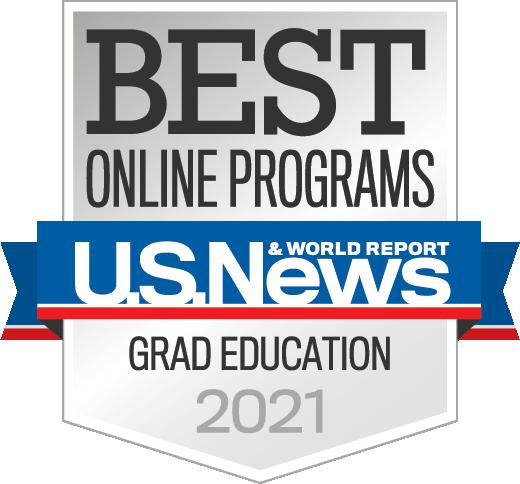
This certificate is designed to provide educators with a rigorous and practical introduction to the skills and knowledge needed to design, develop, deliver, and evaluate courses in engaging online formats, and understand the necessary components of the entire online learning ecosystem. This certificate is ideal for individuals working in a K-12 or higher education setting who are passionate about online learning and want to improve their ability to teach and design online courses.
Program Highlights
• No GRE required
• 12-credit hour certificates
• Complete in just under one year
• Multiple start times: spring, summer, and fall
• 100% online – no campus visits required
WHAT OUR STUDENTS ARE SAYING
“I would absolutely recommend that all educators take these courses because not only do they provide a fantastic foundation for online teaching, but they dive into concepts that even teachers who have been in the profession for 20 years can benefit from learning.”
30 Maine Educator | Spring 2022
800.994.2804 | education@une.edu | online.une.edu LEARN MORE TODAY
Layout Design
Shawn Berry
Leadership
President
Grace Leavitt
Vice President
Jesse Hargrove
Treasurer
Beth French
NEA Director
Rebecca Cole
Board of Directors

District A: Natasha Brewer
District B: Suzen Polk-Hoffses
District C: Ellen Payne
District D: Cedena McAvoy
District E: Thresa Mitchell
District F: Janice Murphy
District G: Nancy Mitchell
District H: Dennis Boyd
District I: Evelyn Atwood

District J: Rebecca Pruente
District K: Tom Walsh
District L: Rebecca Manchester
District M: Chris Jones
District O: Lisa Leduc
District P: Dina Goodwin
District R: Gary McGrane
District ESP: Jamie McAlpine
Student Observer: Kira Yardley
Maine Educator (ISSN #1069-1235) is published by: Maine Education Association
35 Community Drive, Augusta, ME 04330-8005 207-622-4418; fax 207-623-2129
POSTMASTER: send address changes to: Maine Educator
35 Community Drive, Augusta, Maine 04330-8005
Non-Profit US Postage paid at Augusta, Maine and additional mailing offices.
For advertising rates and information please contact: Shawn Berry
35 Community Dr., Augusta, ME 04330 207-622-4418 ext. 2206
My oldest son is now 13. I had no idea how much this would hit me. It wasn’t necessarily the fact that he became a teenager, and how much more white hair I am covering up with dye. Instead, what affected me the most was the feeling of being shut out of his life. I was not even remotely close to being ready for that feeling ��. When nearly every answer to every question is, “I don’t know,” or “Sure,” as a mom-it stings. I know my son has a vast vocabulary because it felt like not long ago, he wouldn't stop talking to me—now I'm left with a changed child I am struggling to relate to in the same way.
I’ve tried to learn a lot of teenage things without seeming lame--I'm failing at this--but I'm trying. Middle school boys, I've learned (as many of you know), are interesting, delicate creatures who use strange words and do funny dances with even more bizarre names like, “Gritty.” I’ve learned some slang but am careful not to ever actually use the words. Heaven, forbid I say something is “fire,” �� �� �� but at least I understand what it means when my son says it. I have never felt so much like I'm out of touch and unrelatable at the same time while doing everything possible to try and connect.
The changes feel like they came overnight during a school year that has been full of change. The never-ending changes in COVID protocols, masks, no masks, now masks again. Pool testing, then no pool testing. Lunch together, then separate again. So. Much. Change. But, through it all our educators persisted, and your Union worked hard to make those changes as smooth as possible. MEA fought, and won, COVID sick days, increased funding for schools, more money for your pension and more. You can read more about the advocacy work of MEA on page 4.
MEA knows this was the hardest school year, likely ever, and wanted to make sure that the public understood all you’ve dealt with this year. Dealing with every challenge and change was difficult but you found ways to connect, and helped students finish the school year with as much success as possible. Those stories were important to share, and MEA launched a Thanks2You media campaign to help parents and community members learn more about what this year was really like. You can check out the videos on our website, maineea.org and read more about the campaign on page 10.
While hard, change can be good. While transitioning from masks to no masks, there was the joy of seeing smiles again. And when pool testing stopped, there was the hope COVID numbers were declining. And when my teenager found more independence and ventured to Starbucks on his own, he had something new he wanted to talk to me about... so I let him chat for as long as he wanted about his new favorite drink. I will hold on to all the little moments that made me smile this school year that was full of change, and it is in those moments I will find joy.... because I hear monkeypox is a “thing..." and who the heck knows what that means or what it’s bringing (funny not funny). So, for now, celebrating summer is priority number one; you all have more than earned it.
Bechard Editor editor@maineea.org
MAINEEA.ORG 31
E DITOR'S
Staff
NOTE - SUMMER 2022 Editorial
Managing Editor
Rachelle Johnson
Editor
Giovanna Bechard
13
�� ��
Giovanna
��
Graduate Programs That Change Lives
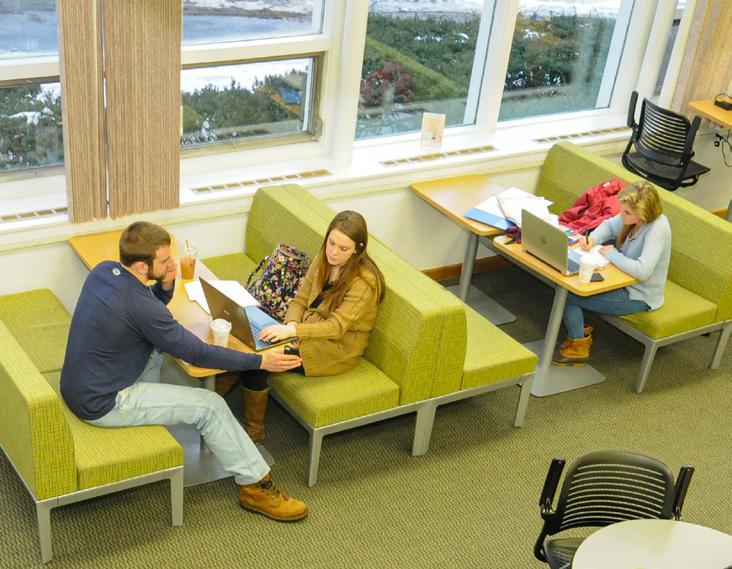
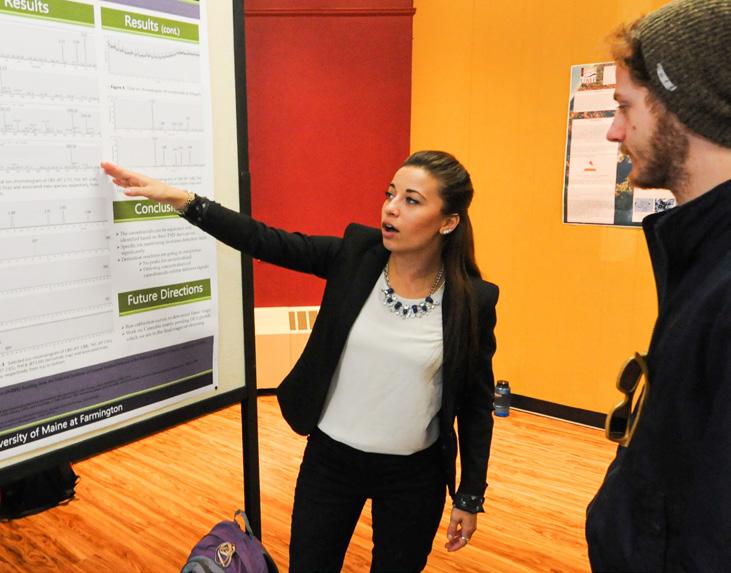

Those Who Can, Teach. Those Who Teach, Advance Their Careers at Farmington.
Whether you’re seeking to earn the credentials, knowledge and skill sets to climb the ladder at your current school, to become a more valuable educator wherever you choose, or to be the kind of educator other teachers want to emulate, the University of Maine at Farmington M.S.Ed. in Educational Leadership will help you get there.
M.S.Ed. in Educational Leadership is designed for professional educators who want to become leaders in their classrooms, schools, school districts or other educational settings.
• Delivered in blended format: 70% online / 30% face-to-face
• Emphasizes school improvement knowledge and skills grounded in research • Organized in a collaborative cohort format
Other Graduate Programs Offered at Farmington • M.S.Ed. in Early Childhood • M.S.Ed. in Special Education • M.A. in Counseling Psychology - Emphasis in Creative Arts • Online M.Ed. in Instructional Technology
Certificate in Administration • Certificate in Assistive Technology • Certificate in Gifted and Talented Education • Certificate in Math Leadership • And more! Accredited by the New England Commission of Higher Education (NECHE) and the Council for the Accreditation of Educator Preparation (CAEP)
> > > > >
•
M.S.Ed in
—
New
This Summer! Learn More: www.farmington.edu/edleader-1 NON PROFIT US POSTAGE PAID AUGUSTA, ME PERMIT NO. 275 M aine Education Association 35 Community Drive Augusta, ME 04330
Educational Leadership
Enrolling a
Cohort














 Maine Education Association
Maine Education Association







 Sara Flanagan, Assistant Professor of Special Education Danielle Gabrielli, University of Maine
Sara Flanagan, Assistant Professor of Special Education Danielle Gabrielli, University of Maine











































 Ashley Bryan Arts & Humanities Award Sylvia Jadczak (RSU 18 EA)
Golden Apple Award The Civil Rights Team Project
Golden Apple Award The Game Loft Human
Ashley Bryan Arts & Humanities Award Sylvia Jadczak (RSU 18 EA)
Golden Apple Award The Civil Rights Team Project
Golden Apple Award The Game Loft Human































